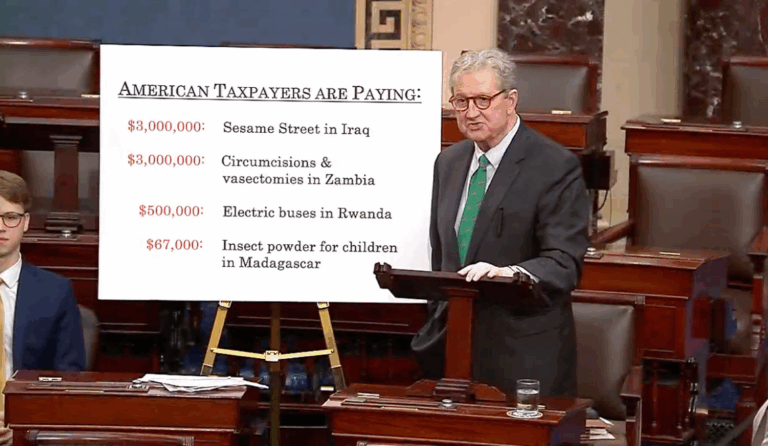“You either believe in reducing spending or you don’t.”
WASHINGTON, D.C. — U.S. Senator John Kennedy (R-La.) took to the Senate floor this week to urge his colleagues to support a $9.4 billion rescission package introduced by President Trump and backed by congressional Republicans aimed at reducing unnecessary federal spending.
“We’ve got a $7 trillion budget,” Kennedy said. “Every fair-minded person would have to agree that there’s some money being spent in that $7 trillion that shouldn’t be spent. It just shouldn’t. It’s wasted money.”
Kennedy offered specific examples from the rescission proposal — what he referred to as “spending porn” — including:
- $3 million for Sesame Street production in Iraq
- $3 million to Zambia for circumcisions and vasectomies
- $500,000 for electric buses in Rwanda
- $67,000 for insect powder for children in Madagascar
- $3.6 million for Haiti programs including pastry classes and dance focus groups for male prostitutes
- $833,000 for a Nepal contract assisting transgender individuals, sex workers, and their clients
“This is money we appropriated, but we didn’t tell them to go spend it that way,” Kennedy said. “The president is asking us to cancel the spending.”
Kennedy, who has served in the Senate since 2017, criticized lawmakers who speak about fiscal responsibility but resist action when specific cuts are proposed.
“Reducing spending is like going to heaven,” he remarked. “Everyone says they want to go, but few want to take the trip today.”
The Louisiana senator concluded with a direct challenge to his colleagues:
“It is gut-check time. You either believe in reducing spending or you don’t. And if you talk the game and say, ‘Let’s reduce spending,’ and then vote against this bill, you ought to hide your head in a bag. Because you’ll be able to cut the hypocrisy with a knife. It’s real hard to preach temperance from a barstool.”
The rescission bill calls for eliminating less than one-tenth of one percent of the total federal budget but has sparked debate over what constitutes waste and who gets to decide how funds are allocated.

